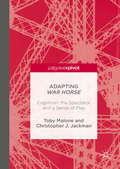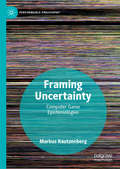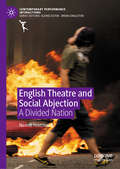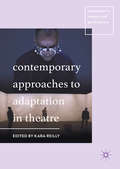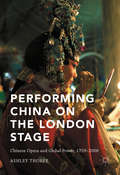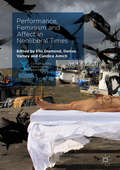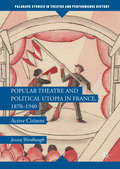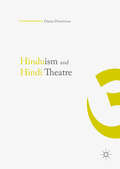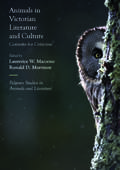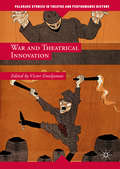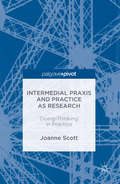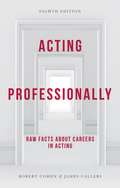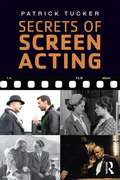- Table View
- List View
Adapting War Horse: Cognition, the Spectator, and a Sense of Play
by Toby Malone Chris JackmanThis book analyses the success and adaptation of Michael Morpurgo's novel War Horse to stage, radio, live events, and feature film, in different cultures, on tours, and in translation. In under a decade, War Horse has gone from obscure children's novel to arguably one of the world's most recognisable theatrical brands, thanks to innovative puppet designs from South Africa's Handspring Puppet Company in an acclaimed stage production from the National Theatre of Great Britain. With emphasis on embodied spectatorship, collaborative meaning-making, and imaginative 'play,' this book generates fresh insights into the enduring popularity of the franchise's eponymous protagonist, Joey, offering the most in-depth study of War Horse to date.
Framing Uncertainty: Computer Game Epistemologies (Performance Philosophy)
by Markus RautzenbergThis book presents a compilation of articles on the subject of game studies written over the last ten years. These texts reflect a decade of research in European computer game studies from a theoretical perspective that combines philosophy, cultural studies, visual studies, and media studies in a way that is unique to a specific type of media theory developed in Germany over the last thirty years. This theory differs quite significantly from media studies as usually conceived in Anglo-American academia, providing new perspectives that are rooted in continental philosophical traditions ranging from phenomenology to post-structuralism and newer forms of “presence studies” in aesthetic theory. The book provides (1) an introduction to a continental approach to game philosophy; (2) an aesthetic theory of computer games rooted in concepts of performativity and epistemology; and (3) an introduction to an interdisciplinary approach to game studies that is based on philosophical perspectives on the subject matter.
English Theatre and Social Abjection: A Divided Nation (Contemporary Performance InterActions)
by Nadine HoldsworthFocusing on contemporary English theatre, this book asks a series of questions: How has theatre contributed to understandings of the North-South divide? What have theatrical treatments of riots offered to wider debates about their causes and consequences? Has theatre been able to intervene in the social unease around Gypsy and Traveller communities? How has theatre challenged white privilege and the persistent denigration of black citizens? In approaching these questions, this book argues that the nation is blighted by a number of internal rifts that pit people against each other in ways that cast particular groups as threats to the nation, as unruly or demeaned citizens – as ‘social abjects’. It interrogates how those divisions are generated and circulated in public discourse and how theatre offers up counter-hegemonic and resistant practices that question and challenge negative stigmatization, but also how theatre can contribute to the recirculation of problematic cultural imaginaries.
Contemporary Approaches to Adaptation in Theatre (Adaptation in Theatre and Performance)
by Kara ReillyThis book examines contemporary approaches to adaptation in theatre through seventeen international case studies. It explores company and directorial approaches to adaptation through analysis of the work of Kneehigh, Mabou Mines, Robert Le Page and Katie Mitchell. It then moves on to look at the transformation of the novel onto the stage in the work of Mitchell, and in The Red Badge of Courage, The Kite Runner, Anne Frank, and Fanny Hill. Next, it examines contemporary radical adaptations of Trojan Women and The Iliad. Finally, it looks at five different approaches to postmodern metatheatrical adaptation in early modern texts of Hamlet, The Changeling, and Faustus, as well as the work of the Neo-Futurists, and the mash-up Medea/Macbeth/Cinderella. Overall, this comprehensive study offers insights into key productions, ideas about approaches to adaptation, and current debates on fidelity, postmodernism and remediation.
Performing China on the London Stage
by Ashley ThorpeThis book details the history of Chinese theatre, and British representations of Chinese theatre, on the London stage over a 250-year period. A wide range of performance case studies - from exhibitions and British Chinese opera inspired theatre, to translations of Chinese plays and visiting troupes - highlight the evolving nature of Sino-British trade, fashion, migration, the formation of diaspora, and international relations. Collectively, they outline the complex relationship between Britain and China - the rise and fall of the British Empire, and the fall and rise of China - as it was played out on the stages of London across three centuries. Drawing extensively upon archival materials and fieldwork research, the book offers new insights for intercultural British theatre in the 21st century - 'the Asian century'.
Performance, Feminism and Affect in Neoliberal Times (Contemporary Performance InterActions)
by Elin Diamond Denise Varney Candice AmichThis book is a provocative new study of global feminist activism that opposes neoliberal regimes across several sites including Asia, Australia, Canada, Europe, Latin America and the United States. The feminist performative acts featured in the book contest the aggressive unravelling of collectively won gains in gender, sexual and racial equality, the appearance of new planes of discrimination, and the social consequences of political economies based on free market ideology. The investigations of affect theory follow the circulation of intensities – of political impingements on bodies, subjective and symbolic violence, and the shock of dispossession – within and beyond individuals to the social and political sphere. Affect is a helpful matrix for discussing the volatile interactivity between performer and spectator, whether live or technologically mediated. Contending that there is no activism without affect, the collection brings back to the table the activist and hopeful potential of feminism.
Popular Theatre and Political Utopia in France, 1870—1940
by Jessica WardhaughThis book is the first study of popular theatre in France from left to right, exploring how theatre shapes political acts, ideals, and communities in the modern world. As the French found innovative ways of imagining culture and politics in the age of the masses, popular theatre became central to the republican project of using art to create citizens, using secular spaces for the experience of civic communion. But while state projects often faltered in finding playwrights, locations, and audiences, popular theatre flourished on the political and geographical peripheries. Drawing on extensive archival research, this book illuminates lost worlds of political conviviality, from anarchist communes and clandestine agit-prop drama to royalist street politics and right-wing mass spectacle. It reveals new connections between French initiatives and their European counterparts, and demonstrates the enduring strength of radical communities in shaping political ideals and engagement.
Hinduism and Hindi Theater
by Diana DimitrovaThis book explores the representation of Hinduism through myth and discourse in urban Hindi theatre in the period 1880-1960. It discusses representative works of seven influential playwrights and looks into the ways they have imagined and re-imagined Hindu traditions. Diana Dimitrova examines the intersections of Hinduism and Hindi theatre, emphasizing the important role that both myth and discourse play in the representation of Hindu traditions in the works of Bharatendu Harishcandra, Jayshankar Prasad, Lakshminarayan Mishra, Jagdishcandra Mathur, Bhuvaneshvar, Upendranath Ashk, and Mohan Rakesh. Dimitrova'a analysis suggests either a traditionalist or a more modernist stance toward religious issues. She emphasizes the absence of Hindi-speaking authors who deal with issues implicit to the Muslim or Sikh or Jain, etc. traditions. This prompts her to suggest that Hindi theatre of the period 1880-1960, as represented in the works of the seven dramatists discussed, should be seen as truly 'Hindu-Hindi' theatre.
Animals in Victorian Literature and Culture: Contexts for Criticism (Palgrave Studies in Animals and Literature)
by Laurence W. Mazzeno Ronald D. MorrisonThis collection includes twelve provocative essays from a diverse group of international scholars, who utilize a range of interdisciplinary approaches to analyze "real" and "representational" animals that stand out as culturally significant to Victorian literature and culture. Essays focus on a wide range of canonical and non-canonical Victorian writers, including Charles Dickens, Anthony Trollope, Anna Sewell, Emily Bronte, James Thomson, Christina Rossetti, and Richard Marsh, and they focus on a diverse array of forms: fiction, poetry, journalism, and letters. These essays consider a wide range of cultural attitudes and literary treatments of animals in the Victorian Age, including the development of the animal protection movement, the importation of animals from the expanding Empire, the acclimatization of British animals in other countries, and the problems associated with increasing pet ownership. The collection also includes an Introduction co-written by the editors and Suggestions for Further Study, and will prove of interest to scholars and students across the multiple disciplines which comprise Animal Studies.
War and Theatrical Innovation
by Victor EmeljanowThis book examines the relationship between wartime conflict and theatre practices. Bringing together a diverse collection of essays in one volume, it offers both a geographically and historically wide view of the subject, taking examples from Britain, Australia and America to the Middle East, Korea and China, and spanning the fifth century BCE to the present day. It explores the ways in which theatre practices have been manipulated for use in political and military propaganda, such as the employment of scenographers to work on camouflage and the application of acting methods in espionage training. It also maps the change in relationships between performers and audiences as a result of conflict, and the emergence of new forms of patronage during wartime theatre-going, boosting morale at periods when social structures and identity were being destabilized.
Intermedial Praxis and Practice as Research
by Joanne ScottIn this book, Jo Scott shares writing and documentation from her practice as research (PaR) project, which explored and analysed a mode of performance she developed, called live intermediality. The book offers a much-needed example of fully developed writing in relation to a practice as research (PaR) project. Weaving together theory, documentation and critical reflection, it offers fresh insights into both the process and presentation of PaR work, as well as theories around intermediality in performance, the role and actions of the live media performer and how live media events are created. It can be read alongside Robin Nelson's 2013 text, Practice as Research in the Arts, as it demonstrates how Nelson's model for PaR can be applied and developed. It also includes a set of online videos and commentaries, which complement and reflect on the writing in the core text.
Acting Professionally (8th Edition)
by Robert Cohen James CalleriThis vital resource will steer you through the hugely competitive industry of stage, film and TV acting, offering wise advice on everything from writing an eye-catching résumé to finding an agent. It will give you a clear understanding of how acting careers are built and sustained, and how actors must position themselves in an environment overseen by directors, agents, casting directors and acting unions. Praised for its honest and critical understanding of the industry, the text has retained its status as the leading book in its field since the first edition published in 1972. Acclaimed industry professional authors Robert Cohen and James Calleri offer vast insight and experience as professors, directors, playwrights and casting directors, making the text essential reading for all students and lecturers of Acting at universities, drama schools and conservatories, as well as anyone interested in pursuing and developing their career in acting.
Secrets of Screen Acting Third Edition
by Patrick TuckerWhen it was first published in 1993, Secrets of Screen Acting broke new ground in explaining how acting for the camera is different from acting on stage. Reaction time is altered, physical timing and placement are reconceived, and the proportions of the digital frame itself become the measure of all things, so the director must conceptualize each image in terms of this new rectangle and actors must 'fit' into the frame. Based on a revolutionary non-Method approach to acting, this book shows what actually works: how an actor, an announcer--anyone working in front of the cameras--gives excellent performances on screen.
Sophocles' Antigone
by Diane J. RayorSophocles' Antigone comes alive in this new translation that will be useful for academic study and stage production. Diane Rayor's accurate yet accessible translation reflects the play's inherent theatricality. She provides an analytical introduction and comprehensive notes, and the edition includes an essay by director Karen Libman. Antigone begins after Oedipus and Jocasta's sons have killed each other in battle over the kingship. The new king, Kreon, decrees that the brother who attacked with a foreign army remain unburied and promises death to anyone who defies him. The play centers on Antigone's refusal to obey Kreon's law and Kreon's refusal to allow her brother's burial. Each acts on principle colored by gender, personality and family history. Antigone poses a conflict between passionate characters whose extreme stances leave no room for compromise. The highly charged struggle between the individual and the state has powerful implications for ethical and political situations today.
Aristophanes and the Poetics of Competition
by Zachary P. BilesAthenian comic drama was written for performance at festivals honouring the god Dionysos. Through dramatic action and open discourse, poets sought to engage their rivals and impress the audience, all in an effort to obtain victory in the competitions. This book uses that competitive performance context as an interpretive framework within which to understand the thematic interests shaping the plots and poetic quality of Aristophanes' plays in particular, and of Old Comedy in general. Studying five individual plays from the Aristophanic corpus as well as fragments of other comic poets, it reveals the competitive poetics distinctive to each. It also traces thematic connections with other poetic traditions, especially epic, lyric, and tragedy, and thereby seeks to place competitive poetics within broader trends in Greek literature.
Sophocles
by P. J. FinglassSophocles' Ajax describes the fall of a mighty warrior denied the honour which he believed was his due. This new edition of the play presents a text and critical apparatus which take full advantage of recent advances in our understanding of Sophoclean manuscripts and scholarship. The introduction and commentary scrutinise all important aspects of the drama - from detailed analysis of style, language and metre to consideration of wider issues such as ethics, rhetoric and characterisation. Notorious dramaturgical problems, including the staging of Ajax's suicide, receive particular attention; so too do questions of literary history, such as the date of the play and Sophocles' creative interaction with previous accounts of the myth. The translation which accompanies the commentary ensures that this edition will be accessible to Hellenists of all levels of experience, as well as to readers with a general interest in the history of drama.
Shakespeare, Rhetoric and Cognition
by Raphael LyneRaphael Lyne addresses a crucial Shakespearean question: why do characters in the grip of emotional crises deliver such extraordinarily beautiful and ambitious speeches? How do they manage to be so inventive when they are perplexed? Their dense, complex, articulate speeches at intensely dramatic moments are often seen as psychological - they uncover and investigate inwardness, character and motivation - and as rhetorical - they involve heightened language, deploying recognisable techniques. Focusing on A Midsummer Night's Dream, Othello, Cymbeline and the Sonnets, Lyne explores both the psychological and rhetorical elements of Shakespeare's language. In the light of cognitive linguistics and cognitive literary theory he shows how Renaissance rhetoric could be considered a kind of cognitive science, an attempt to map out the patterns of thinking. His study reveals how Shakespeare's metaphors and similes work to think, interpret and resolve, and how their struggle to do so results in extraordinary poetry.
Performing Oaths in Classical Greek Drama
by Judith FletcherOaths were ubiquitous rituals in ancient Athenian legal, commercial, civic and international spheres. Their importance is reflected by the fact that much of surviving Greek drama features a formal oath sworn before the audience. This is the first comprehensive study of that phenomenon. The book explores how the oath can mark or structure a dramatic plot, at times compelling characters like Euripides' Hippolytus to act contrary to their best interests. It demonstrates how dramatic oaths resonate with oath rituals familiar to the Athenian audiences. Aristophanes' Lysistrata and her accomplices, for example, swear an oath that blends protocols of international treaties with priestesses' vows of sexual abstinence. By employing the principles of speech act theory, this book examines how the performative power of the dramatic oath can mirror the status quo, but also disturb categories of gender, social status and civic identity in ways that redistribute and confound social authority.
Tragic Pathos
by Dana Lacourse MunteanuScholars have often focused on understanding Aristotle's poetic theory, and particularly the concept of catharsis in the Poetics, as a response to Plato's critique of pity in the Republic. However, this book shows that, while Greek thinkers all acknowledge pity and some form of fear as responses to tragedy, each assumes a different purpose for the two emotions and mode of presentation and, to a degree, understanding of them. This book reassesses expressions of the emotions within different tragedies and explores emotional responses to and discussions of the tragedies by contemporary philosophers, providing insights into the ethical and social implications of the emotions.
Theatre and Testimony in Shakespeare'S England
by Holger Schott SymeHolger Syme presents a radically new explanation for the theatre's importance in Shakespeare's time. He portrays early modern England as a culture of mediation, dominated by transactions in which one person stood in for another, giving voice to absent speakers or bringing past events to life. No art form related more immediately to this culture than the theatre. Arguing against the influential view that the period underwent a crisis of representation, Syme draws upon extensive archival research in the fields of law, demonology, historiography and science to trace a pervasive conviction that testimony and report, delivered by properly authorised figures, provided access to truth. Through detailed close readings of plays by Ben Jonson and William Shakespeare – in particular Volpone, Richard II and The Winter's Tale – and analyses of criminal trial procedures, the book constructs a revisionist account of the nature of representation on the early modern stage.
Performing Greek Comedy
by Alan HughesAlan Hughes presents a new complete account of production methods in Greek comedy. The book summarizes contemporary research and disputes, on such topics as acting techniques, theater buildings, masks and costumes, music and the chorus. Evidence is re-interpreted and traditional doctrine overthrown. Comedy is presented as the pan-Hellenic, visual art of theater, not as Athenian literature. Recent discoveries in visual evidence are used to stimulate significant historical revisions. The author has directly examined 350 vase scenes of comedy in performance and actor-figurines, in 75 collections, from Melbourne to St Petersburg. Their testimony is applied to acting techniques and costumes, and women's participation in comedy and mime. The chapters are arranged by topic, for convenient reference by scholars and students of theater history, literature, classics and drama. Overall, the book provides a fresh practical insight into this continually developing subject.
Sexual Politics in the Work of Tennessee Williams
by Michael S. D. HooperMichael S. D. Hooper reverses the recent trend of regarding Tennessee Williams as fundamentally a social writer following the discovery, publication and/or performance of plays from both ends of his career – the 'proletarian' apprentice years of Candles to the Sun and Not About Nightingales and the once overlooked final period of, amongst many other plays, The Red Devil Battery Sign. Hooper contends that recent criticism has exaggerated the political engagement and egalitarian credentials of a writer whose characters and situations revert to a reactionary politics of the individual dominated by the negotiation of sexual power. Directly, or more often indirectly, Williams' writing expresses social disaffection before glamorising the outcast and shelving thoughts of political change. Through detailed analysis of canonical texts the book sheds new light on Williams' work, as well as on the cultural and social life of mid-twentieth-century America.
Greek Tragic Style
by R. B. RutherfordGreek tragedy is widely read and performed, but outside the commentary tradition detailed study of the poetic style and language of Aeschylus, Sophocles and Euripides has been relatively neglected. This book seeks to fill that gap by providing an account of the poetics of the tragic genre. The author describes the varied handling of spoken dialogue and of lyric song; major topics such as vocabulary, rhetoric and imagery are considered in detail and illustrated from a broad range of plays. The contribution of the chorus to the dramas is also discussed. Characterisation, irony and generalising statements are treated in separate chapters and these topics are illuminated by comparisons which show not only what is shared by the three major dramatists but also what distinguishes their practice. The book sheds light both on the genre as a whole and on many particular passages.
When Heroes Sing
by Sarah NooterThis book examines the lyrical voice of Sophocles' heroes and argues that their identities are grounded in poetic identity and power. It begins by looking at how voice can be distinguished in Greek tragedy and by exploring ways that the language of tragedy was influenced by other kinds of poetry in late fifth-century Athens. In subsequent chapters, Professor Nooter undertakes close readings of Sophocles' plays to show how the voice of each hero is inflected by song and other markers of lyric poetry. She then argues that the heroes' lyrical voices set them apart from their communities and lend them the authority and abilities of poets. Close analysis of the Greek texts is supplemented by translations and discussions of poetic features more generally, such as apostrophe and address. This study offers new insight into the ways that Sophoclean tragedy inherits and refracts the traditions of other poetic genres.
Slaves and Slavery in Ancient Greek Comic Drama
by Ben Akrigg Rob TordoffHow did audiences of ancient Greek comedy react to the spectacle of masters and slaves? If they were expected to laugh at a slave threatened with a beating by his master at one moment but laugh with him when they bantered familiarly at the next, what does this tell us about ancient Greek slavery? This volume presents ten essays by leading specialists in ancient Greek literature, culture and history, exploring the changing roles and representations of slaves in comic drama from Aristophanes at the height of the Athenian Empire to the New Comedy of Menander and the Hellenistic World. The contributors focus variously on individual comic dramas or on particular historical periods, analysing a wide range of textual, material-culture and comparative data for the practices of slavery and their representation on the ancient Greek comic stage.
